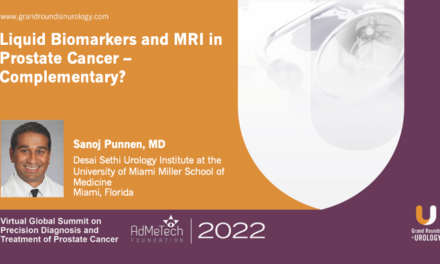Daniel P. Petrylak, MD, presented “Radium-223 Trial Updates” during the 31st International Prostate Cancer Update in July 2021 in Snowbird, Utah.
How to cite: Petrylak, Daniel P. “Radium-223 Trial Updates.” July 2021. Accessed Nov 2025. https://grandroundsinurology.com/radium-223-trial-updates/
Radium-223 Trial Updates – Summary
Daniel P. Petrylak, MD, Director of Genitourinary Oncology, Professor of Medicine and Urology, Co-Leader of Cancer Signaling Networks, and Co-Director of the Signal Transduction Program at Yale University Cancer Center in New Haven, Connecticut, launches his talk with some background on radium-223 before reviewing the ALpharadin in SYMptomatic Prostate CAncer (ALSYMPCA) trial, including study design, patient demographics, and baseline characteristics. He presents an updated analysis of overall survival (OS) which showed a benefit of 3.6 months compared with a placebo. Dr. Petrylak posits that it makes sense to combine radiation and immunotherapy because of potential synergism, citing the abscopal effect. He then refers to a trial, A Phase Ib Study of Atezolizumab with Radium-223 Dichloride in Men with Metastatic Castration-Resistant Prostate Cancer, addressing the three arms of the trial and presenting survival data, including a waterfall plot demonstrating prostate-specific antigen (PSA) and a very modest objective response rate. Dr. Petrylak discusses the evaluation of the abscopal effect, with trial data not showing PDL1 expression increasing after radium-223; in terms of the abscopal effect, Dr. Petrylak concludes, “it’s just not there.” He further concludes that the trial findings were disappointing. Dr. Petrylak then turns his focus to research on radium-223 with abiraterone/prednisone that found increased patient bone fractures. This finding led to an urgent safety letter being issued, mandating the use of bone-protective agent (BPAs) for at least six weeks before the first injection of radium-223 to reduce fractures. Dr. Petrylak cites data from the EORTC 1333/PEACE III trial which confirms that risk of fractures was well controlled when patients with metastatic castration-resistant prostate cancer (mCRPC) received BPAs, emphasizing the importance of compliance with the BSA recommendations. Dr. Petrylak moves on to cite a study examining radium-223 with chemotherapy (docetaxel) showing significant PSA declines. This research is now part of the DORA trial, which is still recruiting patients nationally. Dr. Petrylak addresses radium-223 dosing, citing investigational trials involving higher doses of radium-223 and extended dosing cycles. He concludes that data support the current regimen of six cycles of radium-223 at the standard dose as the optimal regimen in mCRPC. Dr. Petrylak concludes his discussion by emphasizing that combination trials with docetaxel are ongoing.
About The 31st Annual International Prostate Cancer Update:
The International Prostate Cancer Update (IPCU), founded in 1990, is a multi-day CME conference focused on prostate cancer treatment updates with expert, international faculty. It is led by expert physicians and is designed for urologists, medical oncologists, radiation oncologists, and other healthcare professionals involved in the diagnosis and treatment of prostate cancer. Dr. Petrylak delivered this educational activity during the 31st iteration of the meeting in July 2021 in Snowbird, Utah.
ABOUT THE AUTHOR
Daniel P. Petrylak, MD, leads the genitourinary cancers medical oncology team at Smilow Cancer Hospital as director of the genitourinary cancer research group, professor, and co-director of the Cancer Signaling Network program. Dr. Petrylak joined Yale from Herbert Irving Cancer Center at Columbia University Medical Center with New York-Presbyterian Hospital, where he served as Professor of Medicine (Medical Oncology) and Urology and began his appointment in September of 2012. After serving for more than 20 years as the advanced bladder chair for SWOG, Dr. Petrylak is now the Vice Chair of the Genitourinary Committee.





